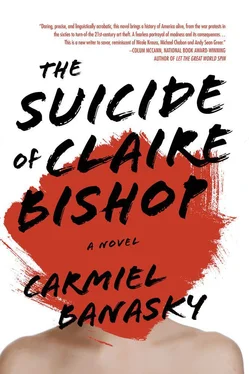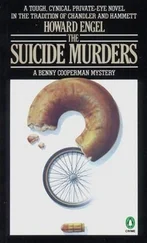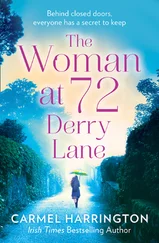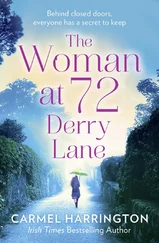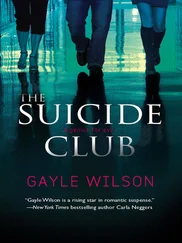Her eyes flutter open. I think she smiles at me.
“It’s you,” she says hoarsely. “I thought you’d come.”
How does she know me? I’ve never been recognized like this.
“You know who I am?” I ask.
Did Nicolette somehow pull everyone together in the past? Perhaps this will all make sense. But for now, no matter the reason, I like being recognized.
“Of course I know her.” She hesitates. “Isn’t your mother Mary?”
The strange certainty of her voice coming from the uncertainty of her body. A body nearly entwined with the cotton of the hospital sheets. IV bags hang from metal hooks, caught fish.
I move closer to her so she can hear me. “My mother’s name is Beth.”
“Mary.” She says this so matter-of-factly that for a moment I believe her. But she doesn’t know me after all. I shouldn’t be disappointed. Why should she know me?
I hold the painting out to her.
And there she is, twice. Lying on the bed and lying in my arms.
She looks at it, unsurprised, her face unchanging. “Do you like it?” she asks.
“Yes, very much.”
“Then you keep it. I don’t need it anymore.”
“But—” That’s very rude, I want to say. I drape the painting over the chair beside the bed and sit down on the edge of the mattress. “May I ask you a question?” I use my politest voice.
“I must look awful like this,” she says.
“Not really, considering.”
“I must get ready for the sitting. But who wants a portrait of a bad woman?”
“A portrait?”
“She’s coming to paint me. I have to make the sandwiches and change into something nice. Lay down a sheet for the easel, will you? The blue cloth we don’t care about.”
I don’t know what else to do so I say, “Okay.” I wonder if I should pretend to lay a sheet.
She tries to sit up. “My hair is a mess. Can she change it in the painting? I will ask her to change my hair.” She looks around, bewildered. “I hope they can swim.”
“Who? Who’s painting your hair?”
She doesn’t answer. She looks at me with sad, wet eyes.
“I think they can swim,” I say. “I need to ask you.”
“That nurse is sleeping with Freddie. She doesn’t know I know. She’s a dumb cunt.”
She coughs for a while and I hold up a small waxy cup of water that she waves off. A thread of pain slithers down her throat and falls in her stomach, nowhere else to go, the spool winding and winding in on itself. I can see it shimmer, like she can.
“So Jill sent you in his place?” she finally asks. “Because he’s too chicken to do it himself. But you’ll help me.”
“I need to ask you. What is the name of the artist who painted this? Is her name Nicolette? I know it is, but I need you to tell me. What did she look like? How old is she? Have you seen her lately?”
“Nicolette,” she says. “Nicolette.” She lifts a gaunt finger. “I can’t seem to die. I’d like to,” she says nonchalantly, as if she needs help crossing the street, “but it won’t let me.”
“It was Nicolette. I knew it was. And the painting won’t let you die, that’s it exactly. You do understand. Nicolette didn’t want you to die.” As if on cue, distant footsteps echo in the hall, recognizable and many. The Hasidim. I lower my voice. “Now you’re ready to go and you can’t.” Her soft moan pushes me to touch the canvas and my fingers feel burnt. There’s only one way. “I have to destroy it.”
“No.” She tries to sit up again but doesn’t get far. “This damn body won’t let me. Besides,” she strains her voice so I can hear, “I want to see the painting there. It took me decades to see it.” She puts her hand on mine. “Did Jill leave you anything else to give to me?”
He said she’d want the pills at the bottom of the envelope.
I shake my head. I have to make her understand. “But the painting won’t let you do that. The suicide belongs to it. It’s keeping you alive.” The footsteps are louder now. The guard must have given me away.
She coughs in response. I bunch her pillow so she can raise her head.
“I’ll get better soon,” she says.
“When did you last see Nicolette? Please tell me,” I whisper. “Don’t you hear them coming?”
She squeezes my shoulder as much as she can. “I don’t want to get better.”
I see her face coming apart and the bed around her, and there’s you telling me to do her in. I will not listen to your selfish voice, your need for drama. I will focus only on Claire.
“Are you afraid to talk about Nicolette? Is that it?” If the painting is preventing Claire’s suicide, then Nicolette did time travel. Which means I can give her the pills and no one will die. Everything holds. It’s an act of verification. No one dies. This is the risk Nicolette’s been preparing me for.
She nods in answer to my thoughts, and moans softly. “They’ll be here soon. Be quick about it,” she says. She knows, too — the Hasidim.
No one dies. I pace around her bed, then back the other way. The walls are beginning to crack and the bees want to come back, but I won’t let them. I’ll make it right. “Let’s think about this here. Let’s take it slow. This is a big thing what you’re asking me. Even though it won’t work. I just met you, and maybe I don’t want to do it. What if I get in trouble? I probably definitely would get in trouble. Wouldn’t I?”
She reaches out a wobbly hand and I stop pacing. “There’s no one else,” she says.
In my hand, her fingers are brittle twigs. I could crush them if I squeezed any tighter.
The windows are giant microphones listening in. The windows are not listening in.
“I’m telling you it won’t work.” It can’t work. I’m not wrong. I’m not wrong after all.
I peek out the curtain to hear the footsteps better, but they’re still just as far. How many minutes since I left the guard? If I’m so certain I needn’t hesitate any longer. Simply an act of verification to prove Premise 1 is true. The heart monitor and alarm is only a simple star network topology — I disable it easily. I unhook the oxygen vine from her nose, unwind it from around her ears. From the envelope, I shake out the three pills Jill put in there, and two from the bottle of Xanax in my bag. This is me giving her medicine for her pain because it can’t kill her because it can’t.
The cup of water at her lips is a cup from another dimension where small people live and live. The footsteps are kicking in my eardrums. She takes the pills. She swallows them.
I sit on the edge of her bed and take her hand again. It feels good in mine. Her skin is alive and wired, a dried-up and rotting apple. She smiles at me. She’s not dying at all, see?
She talks about the spiders and flies she sees in the corners of her eyes. Black shapes on the edge of things. Another set of eyes comes to life behind her own. Real eyes. True eyes. She says, “I know I’m seeing things that aren’t there. How strange. I can say: the things I’m seeing are not there, but that doesn’t make them go away.”
I begin quietly, “Jill says—”
“My bees flew off again when the Towers fell. Twice they ran away.”
I tell her that’s sad, because it is.
“Things disappear all the time. It’s not a mystery.” She falls deeper into her pillow. “I’m not going yet. Why not?”
“I told you,” I say. “The painting.”
“Unplug the damn thing to make sure.” She’s not plugged into anything. There’s the mechanical bed and a desk lamp. I pull both from their sockets to appease her.
“Jill wanted me to tell you—” I say.
“That’s it. The boy left me chocolates on my windowsill. And drool down his chin. Tell Mary that boy drooled all over me.”
Читать дальше
